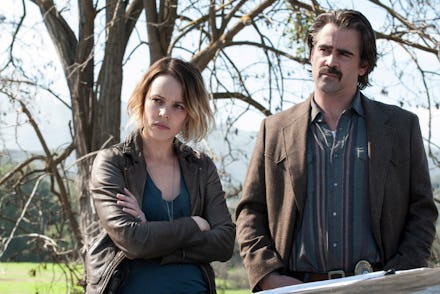This Is Why the 'True Detective' Season 2 Premiere Felt So Underwhelming

When it debuted just a year ago, HBO's True Detective blew the door off a tired, jilted format. The whodunit was old news, but by moving the tension away from the mystery and focusing instead on the complex men investigating it, Nic Pizzolatto created a rich eight-part drama smeared in particularly dark grit.
Yet its second season, which premiered Sunday night, already feels like an underwhelming one. The show has dispensed with the swampy backdrop of Louisiana and its accompanying fog of despair, choosing instead to move the action to Los Angeles and four characters caught in the crossfire of a violent murder.
What once felt like a smart take on the politics of the crime genre seems especially lackluster in True Detective's second season opener, "The Western Book of the Dead."
Second seasons are a difficult nut to crack – just look at Lost, Desperate Housewives or Homeland – but True Detective's issues are different. Pizzolatto is clearly reluctant to cling to that which made the first season a success, which should save it from the usual pitfalls. Instead, we get a range of teething problems season two needs to work through. Here are four:
1. The casting
There's a reason the term "McConaissance" became a trend in 2014. Matthew McConaughey earned critical acclaim for his portrayal of Rustin Cohle over season one's dual timelines, and the neologism pointed to the fact that even someone who can be parodied in Family Guy for making terrible movies can still surprise you.
With the second season expanding the main cast to four characters – emotionally bruised cops played by Colin Farrell, Rachel McAdams and Taylor Kitsch, plus a career criminal trying to break good in Vince Vaughn – the pressure is on not only for these four actors to make smart, innovative characters come to life, but to develop powerful relationships with each other as McConaughey and Woody Harrelson did last year.
Sadly, though, with four characters (and their significant others) to introduce, the first episode manages to feel overpopulated and underdeveloped, which isn't a strong start. Vaughn and Farrell look set to have the most interesting dynamic, but at times it feels like everyone is doing their best homage to Rust Cohle: vacant stares, vague philosophical musings, a perennial feeling of being misunderstood.
This bigger cast will have to work twice as hard to establish any compelling relationships in the same amount of time. 'More,' it seems, is not always more.
2. The location
In season one, you could practically feel the flies buzz around you in the Deep South's warm, heady climes. Stripping the crime scene back to a densely populated cluster of fanatics helped Louisiana become a character in itself and led to the show's distinct visual identity.
While the second season features plenty of impressive visuals, from snaking highways that wriggle through the hills to shots that capture the sweeping scale of California, a cop drama taking place in a metropolitan city feels like a lazy prop for the show to lean against. The sheer population ends up robbing it of any sense of complexity, even if it is a gorgeous sprawl.
A dirty politician? A bent cop working for the bad guys? A Viagra-popping veteran feeling kinda blue? Check, check and check. Rather than subverting typical crime drama tropes, True Detective relies on them more than ever, which doesn't help when the show wants us to think it's continuing to innovate.
3. The time frame
The two timelines in season one — as well as the vastly different relationships framed within — meant that the flickering back and forth gave True Detective an extra dimension in its storytelling.
Coupled with the ongoing investigation, in which both leads regularly said one thing only for us to witness another, the first season was a multi-layered look at human behavior. How those lies and inconsistencies would stack up became the driving force behind the show's initial success.
There's nothing to suggest such a device is being employed in season two, which might be why it feels so loose at times. True, there are flashbacks showing a non-mustachioed Farrell meeting Vaughn's character in a barely-lit bar, but it's a very typical, exposition-laden scene that lacks subtlety.
Is the past no longer as relevant to the future as it was in season one? And if it isn't, has the show effectively stripped away its most confusing (yet compelling) dimension?
4. The crime
Beneath the hazy surface, Louisiana was home to sinister wrongdoings. Ritualistic murders, religious imagery and antlers where there definitely shouldn't be antlers all informed a hyper-specific threat, the looming stench of the occult that placed typical law enforcement officers under a fresh kind of pressure.
In the sweeping metropolis of LA, the driving force seems to be a political sabotage when a corrupt bureaucrat is found dead, his eyes scorched from acid and his genitals destroyed by a shotgun wound.
There are personal ramifications aplenty: The dead man was in business with Vaughn's career criminal, who is desperately trying to construct a law-abiding legacy. But these are all ideas we've seen elsewhere in the sort of shows True Detective's first season was trying to subvert.
It feels like everyone is doing their best homage to Rust Cohle: vacant stares, vague philosophical musings, a feeling of being misunderstood.
Is True Detective interested in asking the big questions this year, or is it content with a beautiful-looking tale? While hitting the reset button might be a smart way to avoid relying too much on the past, it's the distinct lack of True Detective's visual and narrative flair that makes season two so unremarkable to watch.